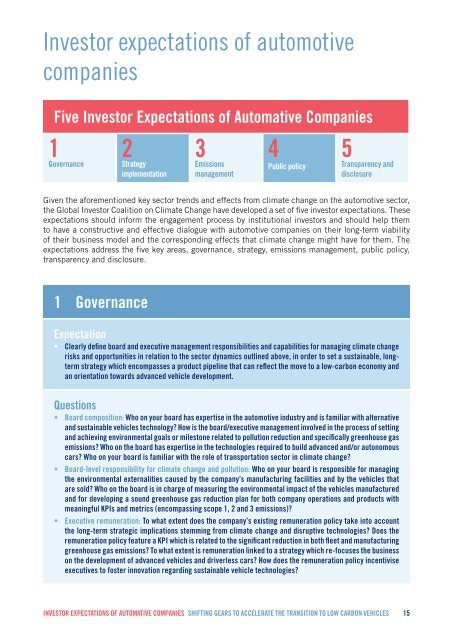INVESTOR EXPECTATIONS OF AUTOMOTIVE COMPANIES
2e2wDxT
2e2wDxT
Create successful ePaper yourself
Turn your PDF publications into a flip-book with our unique Google optimized e-Paper software.
Investor expectations of automotive<br />
companies<br />
Five Investor Expectations of Automative Companies<br />
1 2<br />
Governance Strategy<br />
implementation<br />
3<br />
Emissions<br />
management<br />
4<br />
Public policy<br />
5<br />
Transparency and<br />
disclosure<br />
Given the aforementioned key sector trends and effects from climate change on the automotive sector,<br />
the Global Investor Coalition on Climate Change have developed a set of five investor expectations. These<br />
expectations should inform the engagement process by institutional investors and should help them<br />
to have a constructive and effective dialogue with automotive companies on their long-term viability<br />
of their business model and the corresponding effects that climate change might have for them. The<br />
expectations address the five key areas, governance, strategy, emissions management, public policy,<br />
transparency and disclosure.<br />
1 Governance<br />
Expectation<br />
• Clearly define board and executive management responsibilities and capabilities for managing climate change<br />
risks and opportunities in relation to the sector dynamics outlined above, in order to set a sustainable, longterm<br />
strategy which encompasses a product pipeline that can reflect the move to a low-carbon economy and<br />
an orientation towards advanced vehicle development.<br />
Questions<br />
• Board composition: Who on your board has expertise in the automotive industry and is familiar with alternative<br />
and sustainable vehicles technology? How is the board/executive management involved in the process of setting<br />
and achieving environmental goals or milestone related to pollution reduction and specifically greenhouse gas<br />
emissions? Who on the board has expertise in the technologies required to build advanced and/or autonomous<br />
cars? Who on your board is familiar with the role of transportation sector in climate change?<br />
• Board-level responsibility for climate change and pollution: Who on your board is responsible for managing<br />
the environmental externalities caused by the company’s manufacturing facilities and by the vehicles that<br />
are sold? Who on the board is in charge of measuring the environmental impact of the vehicles manufactured<br />
and for developing a sound greenhouse gas reduction plan for both company operations and products with<br />
meaningful KPIs and metrics (encompassing scope 1, 2 and 3 emissions)?<br />
• Executive remuneration: To what extent does the company’s existing remuneration policy take into account<br />
the long-term strategic implications stemming from climate change and disruptive technologies? Does the<br />
remuneration policy feature a KPI which is related to the significant reduction in both fleet and manufacturing<br />
greenhouse gas emissions? To what extent is remuneration linked to a strategy which re-focuses the business<br />
on the development of advanced vehicles and driverless cars? How does the remuneration policy incentivise<br />
executives to foster innovation regarding sustainable vehicle technologies?<br />
<strong>INVESTOR</strong> <strong>EXPECTATIONS</strong> <strong>OF</strong> AUTOMATIVE <strong>COMPANIES</strong> SHIFTING GEARS TO ACCELERATE THE TRANSITION TO LOW CARBON VEHICLES<br />
15


